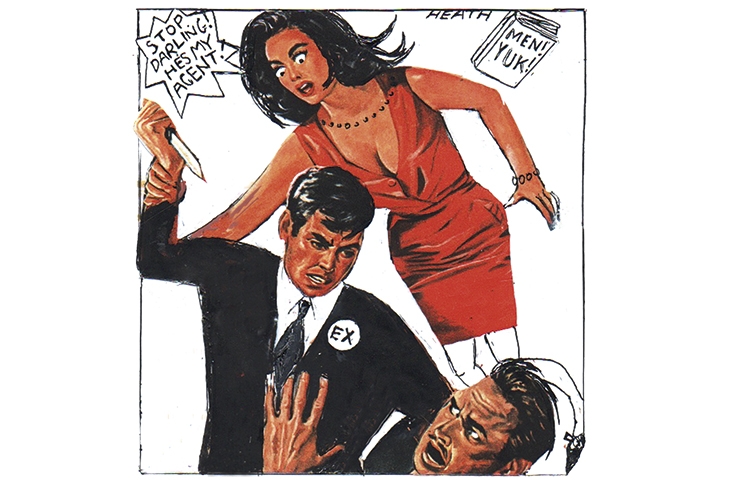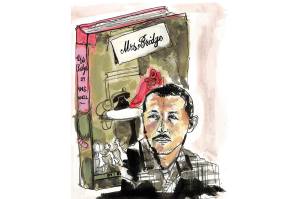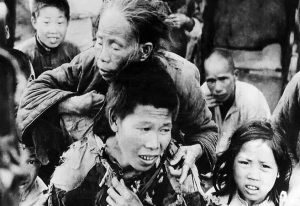Whatever your profession, envy is something we all know. A colleague’s promotion or a friend’s pay increase prompts that inner voice of brattish resentment. Envy is the herpes of competitive capitalism. It disappears from view and just when you think it’s gone for good, up it pops.
But envy hasn’t had much of a chance to surface during COVID-19. Everyone’s career in the so-called creative industries has been put on hold. And we’ve been too worried about the state of the world to talk about that most beloved topic of creative people: our careers.
So I was surprised by my sudden attack of envy. It came when my ex-wife Maxine sent me a WhatsApp video of her opening a box from her publisher, full of copies of her new novel, The Eighth Girl. Proudly she held her book up to the camera, beaming with joy like a mother exhibiting her new-born baby.
I should point out that I have not found a publisher for my book, so I couldn’t help but wonder if it was envy that caused me to see something in my ex-wife’s beatific smile that said: hey loser, look who’s the writer now! Of course, when your ex-wife is struck by unexpected success you’re duty-bound to take it like a man: send flowers, send texts of effusive congratulations and just keep smiling, even as you’re slowly dying inside.
I confess to having mixed feelings. On one level I’m very happy for her. And proud of her too. (Honest!) I spent a fair amount of time reading early drafts and making suggestions and being encouraging. I was the one who got her an agent, which led to the book being published for a large advance. And when she told me it had been optioned by Jason Bateman for Netflix I was chuffed and then…envious.
What makes my ex-wife’s success so hard to deal with is the fact that it’s really a great book. She’s written a gripping psychological thriller with a literary eloquence not usually found in that genre. And this from a woman who had never written anything before. She was a visual person (the art director of Style magazine). I was the writer in the marriage, not her. It’s bad enough that my second wife has a book out but my first wife, Julie Burchill, always has a book in production or about to be published. Knowing my luck, her next one will be a smash hit. To have one ex-wife who has a book out is a misfortune. To have two ex-wives out with books out looks like carelessness.
But that’s not all. My ex-cleaner — yes, cleaner — Michele Kirsch had a book out: Clean, which last year won the Royal Society of Literature’s Christopher Bland Prize of £10,000. It’s brilliant as well. What the hell am I going to do when my dental hygienist sells her novel and wins the Booker Prize?
Before lockdown, I could barely go into bookstores because of the pain of seeing tables groaning under the weight of volumes by friends of mine. Especially difficult was the skyscraper piles of Everything I Know About Love by my former Sunday Times colleague and good friend Dolly Alderton. Lockdown spared me the trauma of seeing her bestselling novel Ghosts in every book-store window I passed.
Why is the success of our friends and loved ones so upsetting to us? Because they move up the status hierarchy while we remain stuck at a lower level. The dynamics of friendship changes when your friend becomes much more successful than you. For starters, you are no longer equals.
Of course you and your successful friend like to pretend that nothing has changed; that your friendship is too long and deep to be altered by anything as ephemeral as success or fame. What a silly idea. And then you notice you don’t see each other as much as you once did.
They start to move in a different world to you. They make new successful friends. You meet rarely for a catch-up lunch where you ask about their book and they say: it’s been sold in America…sold in Japan…sold to Netflix…and has been shortlisted for the Booker Prize. They ask about your book and you don’t know what to say. So you make a silly joke. You both laugh. Nervously. And then there will come the day when they will stop asking about your book because it’s kind of embarrassing for them, and for you. And the catch-up lunches stop, too.
But all the envy, competition, bitching and back-stabbing that goes on in the literary world got put on hold during the COVID-19 pandemic. It seemed so trivial. We were so scared of catching COVID that we forgot about our fear of failure or the success of our friends.
Now, though, thanks to the vaccine, the creatives are preparing to get back to business. Book launches in actual bookshops are being prepared. There’s talk again about the forthcoming Booker Prize. Critical knives are being sharpened. And my ex-wife Maxine is already working on her second book. Which I’m very happy about. Honest.
This article was originally published in The Spectator’s May 2021 World edition.


















